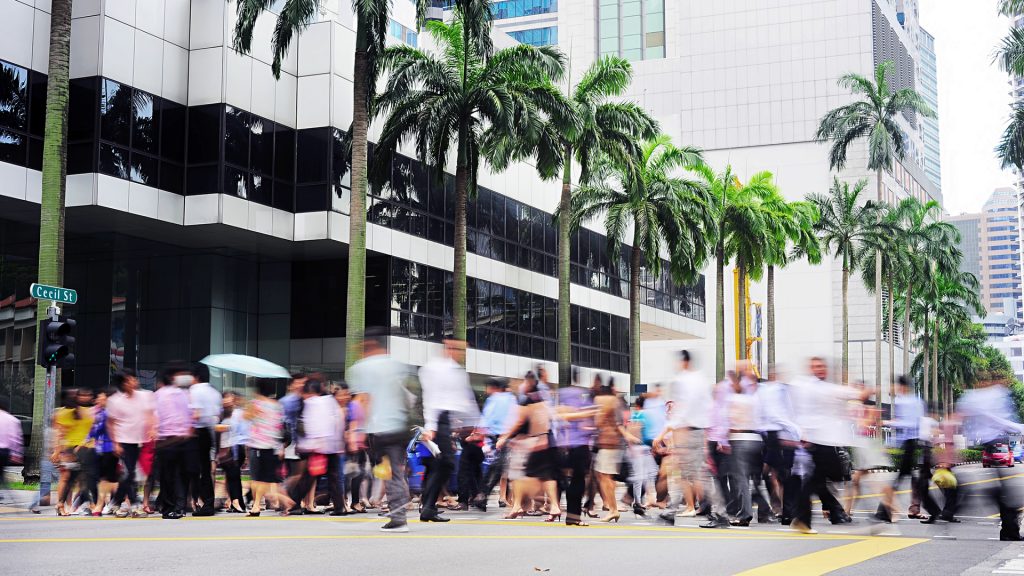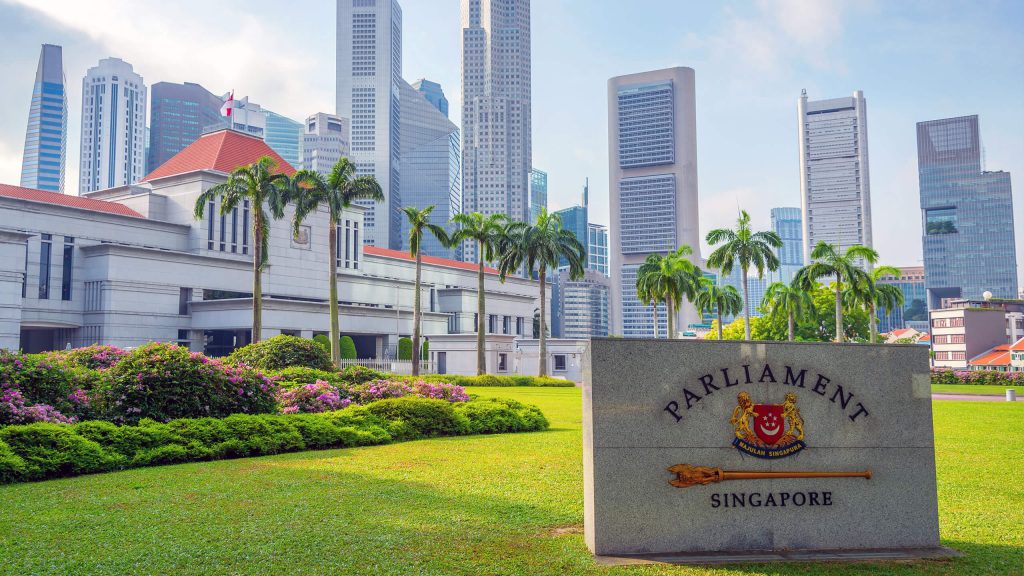Looking to 2021: Prospects for the Singapore economy and jobs market
February 11, 2021
IN BRIEF | 5 min read
- Statistics released by the Ministry of Manpower early this year indicate that resident unemployment rate had fallen in November 2020 compared with October 2020, registering the first such drop in 2020. The question is: will this continue? Dr Kelvin Seah from the Department of Economics at NUS Faculty of Arts and Social Sciences, works out an answer here.

BY DR KELVIN SEAH
“This is the worst year ever to graduate”, a student from my honours class said to me last year. His sentiment was perhaps shared by many in the graduating class of 2020. I could sense the anxiety in them. Never had I received so many emails from students, anxiously seeking advice on how they could enhance their chances of getting a job.
2020 saw economies all over the world, including Singapore, battered by COVID-19. And along with them, their labour markets. In Singapore, monthly resident unemployment rate rose gradually all through 2020 to hit a high of 4.8 percent in October.
Fast forward to 2021 and things are seemingly starting to improve. The Monetary Authority of Singapore’s December 2020 Survey of Professional Forecasters has projected that Singapore’s Gross Domestic Product (GDP) will recover in 2021 and grow by 5.5 per cent.
At the same time, statistics released by the Ministry of Manpower early this year indicate that resident unemployment rate had fallen in November 2020 compared with October 2020, registering the first such drop in 2020. So it seems Singapore has done pretty well in comparison to many other countries. The question is: will this continue?
Is the worst over?
While the fall in unemployment rate and the recovery in GDP are welcome news, we should not take this to mean that we are out of the woods. It would be premature to conclude that the worst is over based on a short-term improvement in just one or two economic indicators. We’ll need a larger set of economic indicators, all of which consistently point towards recovery for a sustained period, to be sure. And even this may not be enough. Because things could quickly change depending on global developments. And these are not within our control.
Singapore is a small open economy which is heavily reliant on global trade and investments. Whether our economy will continue on its path to recovery therefore depends crucially on what happens externally. In particular, it depends on whether countries can successfully contain the virus.
As long as countries continue to see recurrent waves of COVID-19 infections, our road to recovery will be bumpy and unpredictable. For it will mean that movements of people and trade will continue to be restricted. And this will have a dampening effect on economic activity. Aviation, hospitality, tourism, and certain export sectors will continue to be badly affected. This will have ripple effects on the rest of the economy.
Challenge for policymakers
Of course, the development of COVID-19 vaccines have been an encouraging prospect. And if governments across the world can convince their people to vaccinate and protect themselves from the virus, then we can be hopeful that restrictions on movement, trade, and consumer activity will gradually be relaxed. But this will not be easy.
Misinformation on vaccines is constantly circulating on social media, preventing people from making well-informed decisions. According to a survey by Nanyang Technological University (NTU), close to 1 in 4 Singapore residents believe in a false claim that COVID-19 vaccines will alter one’s DNA, with older residents – those most at risk of being infected by COVID-19 – more likely to believe such a falsehood.
It may therefore not be surprising to know that a considerable fraction of our residents do not want to get vaccinated. Indeed, a Straits Times survey conducted in late 2020 found that some 18 percent of residents would not want to receive a COVID-19 vaccine, regardless of whether one was available today or in six to 12 months. This is despite the government announcing that it would provide the vaccine for free. This is worrying because it means that many people will remain susceptible to the virus. So one challenge for policymakers is to find ways to convince their people that the vaccines are safe and effective and to address the problem of misinformation.

Support likely to continue, but sustainability is key
Compared with many other countries, workers in Singapore have been relatively unscathed by the pandemic. True, there have been some retrenchments, and for many, finding a job has been tough. But the situation seems to be under control; unemployment rates in Singapore (although elevated) are nowhere as high as in places like the United States or Hong Kong. Part of the reason is due to the suite of measures introduced by the government to help support jobs.
And among these measures, one stands out – the Jobs Support Scheme (JSS). The JSS, which was first introduced in Budget 2020 and which has since been enhanced and extended, provides wage support to employers to help them retain their local employees.
Under this scheme, the government co-funds some portion of each local employee’s gross monthly wages. This decreases the labour costs borne by companies and provides incentives to retain local workers. Firms in sectors most hard hit by the pandemic are poised to receive these wage subsidies up until March this year while firms in sectors which are managing better received the subsidies till December last year. The JSS has been instrumental in keeping unemployment rates relatively low.
However, it is not a long-term solution. The government will not be able to extend the JSS indefinitely because its coffers are limited. As Deputy Prime Minister Heng Swee Keat rightly put it, “We cannot sustain the JSS at current levels…It draws heavily on our reserves and risks trapping our workers in unviable businesses”.
At some point, the government will have to pull the plug on the scheme. The question is: when? Timing is important. If done too little, too early, we risk withdrawing fiscal stimulus prematurely and pushing Singapore deeper into a recession. If done too much, too late, we risk chalking up a hefty deficit, which future generations will have to bear.
What can we expect for the Singapore economy and the labour market in 2021? As discussed, a lot will depend on how things play out internationally (whether countries will be able to contain the virus, how bilateral relations between the US and China unfold, and more).
Expectations for Budget 2021
At home, we can expect policy to remain expansionary. DPM Heng is set to unveil Budget 2021 in just a few days, on 16 Feb, and already he has hinted that a key priority for the Budget would be to help workers and businesses adapt, innovate and grow. We can therefore expect support for workers and businesses through schemes such as the JSS and the SGUnited Jobs and Skills package to continue.
However, we should also expect that the extent of help will be reduced compared to 2020, since the government needs to keep its spending in check. Support will likely be more targeted, with the bulk of the assistance channelled to those workers and businesses who need it the most – the ones struggling to recover.
Aside from financial assistance, we can also expect Budget 2021 to be centred on economic transformation, where schemes to grow the innovation capabilities of companies and workers to take on the post-COVID world will likely be introduced and strengthened.
Barring unforeseen circumstances, this expansionary stance will mitigate the ill effects of the virus and should help to keep unemployment at manageably low levels.
About the Author
 Dr Kelvin Seah is a Senior Lecturer in the Department of Economics. He is also a Research Affiliate at the Institute of Labor Economics (IZA). His research interests are in the areas of labour economics and the economics of education.
Dr Kelvin Seah is a Senior Lecturer in the Department of Economics. He is also a Research Affiliate at the Institute of Labor Economics (IZA). His research interests are in the areas of labour economics and the economics of education.
This story first appeared in NUSnews on 11 February 2021, as the third installment of the Looking to 2021 series of commentaries on what readers can expect in the new year.

